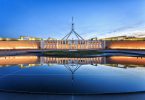![WikiLeaks suppression order censors the press on “national security” grounds [Source: Nikhil / Flickr]](https://thecityjournal.net/wp-content/uploads/2014/09/Blindfold-1024x853.jpg)
WikiLeaks suppression order censors the press on “national security” grounds [Source: Nikhil / Flickr]
The suppression order at the heart of Australia’s biggest bribery scandal exploited national security fears to block much-needed media scrutiny.
Anti-secrecy group WikiLeaks revealed the order – the details of which can’t legally be published – banned publishing certain corruption allegations against high-profile politicians overseas. The order’s purpose was to prevent damage to Australia’s international relations.
Protecting national security is a legitimate reason for courts to issue suppression orders.
Avoiding embarrassment and damage to reputation, which is what the order really appears to be about, is not. Australian case law makes this clear.
This isn’t the first time “international relations” and “national security” have been linked in the battle to control the press.
When the embarrassing Indonesia spying scandal caused the government diplomacy headaches last year, Prime Minister Tony Abbott criticised the ABC’s decision to publish the story. He said the decision made Australia’s national security interests “difficult”.
Previously, such threats to press freedom have been only talk. Not any more.
And the result is chilling: corruption allegations have remained hidden and unscrutinised, the public uninformed. The media’s role as society “watchdog” is ceasing to exist in this post-Edward Snowden era – all for the sake of politics.
If the suppression order stands it would be an alarming precedent for Australia, where free speech remains only an implied right. Media censorship should be the exception, not the rule.
But the making of suppression orders – particularly in Victoria – has been too common.
In its 2014 press freedom report, the Media Entertainment and Arts Alliance referred to Victoria as being “the suppression order capital of Australia”. A recent study found 1501 orders had been issued by Victorian courts in the five years to 2012, and at a rate that appeared to be increasing.
The apparent willingness of the courts to stifle the press in the national interest shows media censorship has become the norm. This is unacceptable and unjustified in light of the vital role journalism plays in democracy. WikiLeaks publisher Julian Assange had it right: “national security” shouldn’t be used as a blanket phrase to cover up corruption.
But against a backdrop of recent national security reforms, such as the new laws against disclosing details of ASIO operations, it seems “national security” is now a justification for media censorship. Unfortunately, democracy is the real victim.





